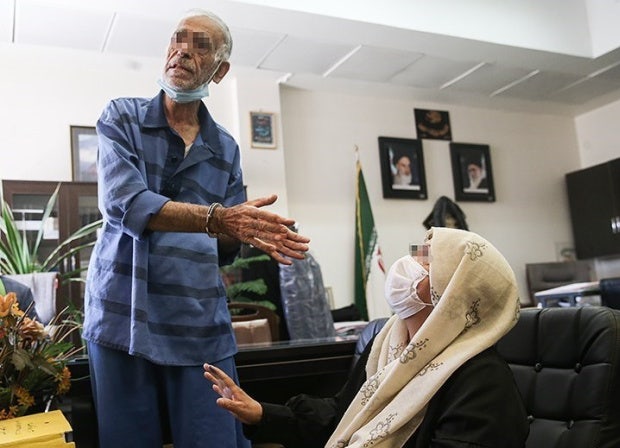Elderly Couple Could Face Death Penalty For Killing Son-In-Law, But Not Murdering Their Own Children
Honor killings are common in the Middle East.
 Zerbor / Shutterstock
Zerbor / Shutterstock At the Shahrak Ekbatan housing complex in Iran, everyone is friendly with each other. They have conversations in the halls, tend to the community gardens, even babysit for each other from time to time.
For most of us, you say hello to your neighbors every day in passing, but you don’t know what goes on secretly behind doors or what their lives are truly like — much less do you expect them to be murderers.
Akbar Khorramdin, 81, and his wife, Iran Mousavi, 74, were the elderly couple that no one would have suspected to commit a string of murders that included their own children.
The remorseless couple confessed to murdering their son, daughter, and son-in-law.
“We cannot comprehend that there were murderers living among us,” said one resident, Minoo, a 51-year-old mother of two, who gave only her first name because she remains afraid of the family. “We may have passed them by every day and said hello. This apartment next to us was a house of horror and none of us knew.”
The first discovery was made in May 2021, when sanitation workers discovered the remains of the couple’s son, Babak, 47, in a garbage bin outside of the housing complex.
Upon the reporting of the remains, the couple were interrogated by police, ultimately confessing to the crime of drugging, suffocating, and then stabbing their son, later dismembering him to fit the body into trash bags to dispose of.
But that wasn’t all. Police felt there was more to the crime than met the eye.
The parents felt no remorse for their actions, and there were even two missing persons reports of people in relation to the couple — their daughter, Arezou, who went missing in 2018, and her husband, Faramarz, who went missing in 2011.
After more questioning, the couple confessed to having murdered them as well, with no discovery of their bodies.
“I have no guilty conscience for any of the murders,” Mr. Khorramdin said in a television interview from detention. “I killed people who were very morally corrupt.”
Mousavi is sticking by Khorramdin's side and defending both of their actions.
“We decided together, the two of us,” Mousavi said in a television interview shortly after she was arrested. “My husband suggested it and I agreed. I have a great relationship with my husband. He doesn’t beat me or curse at me.”
While the couple undergo a psychiatric evaluation, according to officials, the country of Iran has been shaken by the case.
Dealing with a pandemic and vaccine shortages, a suffering economy under government sanctions, and a conservative political takeover that threatens the social freedom of the people, this case hits close to home.
One year ago, a father’s beheading of his 14-year-old daughter who ran away with her boyfriend sparked a controversy that ultimately led to laws being passed that protected children better — called “Romina’s Law.”
There have also been thousands of instances of honor killings in the region.
Unfortunately, that doesn’t change the fact that under Iran’s penal code, which is based on Islamic sharia law, stipulates that as guardians of their children, fathers and grandfathers are exempt from the death penalty for murder.
 Babak Khorramdin's parents in the criminal court, Photo: Tasnim News Agency, CC BY 4.0, via Wikimedia Commons
Babak Khorramdin's parents in the criminal court, Photo: Tasnim News Agency, CC BY 4.0, via Wikimedia Commons
Despite the horrible crimes, the maximum sentence the couple can receive is only 10 years in prison.
This means that Khorramdin and his wife could face the death penalty over the killing of their daughter’s husband, but not the killing of their daughter or son.
In the aftermath of the Khorramdin family murders, the judiciary announced it had requested that Parliament amend the penal code to increase the punishment male guardians face for murder.
Khorramdin told the authorities that he would do it all over again — and might even kill his other two adult children, too, if he were released.
Interestingly, as the case developed, Mousavi did not continue to support her husband. In fact, she claims that her husband was actually abusive toward her and she even accused him of raping Arezou.
Previously, during televised interviews, the parents said they had killed their children because they disapproved of their lifestyles.
They accused their son of being physically aggressive, saying he was freeloading off them and having sex with girlfriends. Their daughter, they claimed, was addicted to drugs and drank alcohol, while her husband was abusive and dealt drugs.
Accusations of abuse and drug addiction directly contradict interviews with friends of the victims.
Nima Abbaspour, a 46-year-old film director in Tehrane, said that “they looked like a regular family. [Babak] was respectable and mild mannered, a very calm guy.”
Jaleh, 47, a classmate and neighbor of Arezou, said “[she] was a very quiet girl. She never harmed anyone and growing up she was very obedient and didn’t even have boyfriends.”
When friends of Arezou's ran into her mother and asked where she went, Mousavi said she had migrated to Turkey.
Residents of the municipality asked if they would remove the garbage bins where Babak’s body was found and plant a tree there instead, which they did.
Friends of Babak's are deeply saddened by the loss of the dreamer.
“His dream was to have an impact on society and on people through his films,” said Amirali Alaie, 41, a cinematographer. “But he will forever be remembered as the victim of one of Iran’s most horrific, violent murders.”
It remains to be seen if the result will have any effect on the laws that govern male guardian sentencing or if the elderly couple will face the death penalty, but their indictment should be soon according to Iranian officials.
Isaac Serna-Diez is a writer who focuses on entertainment and news, social justice and relationships.

